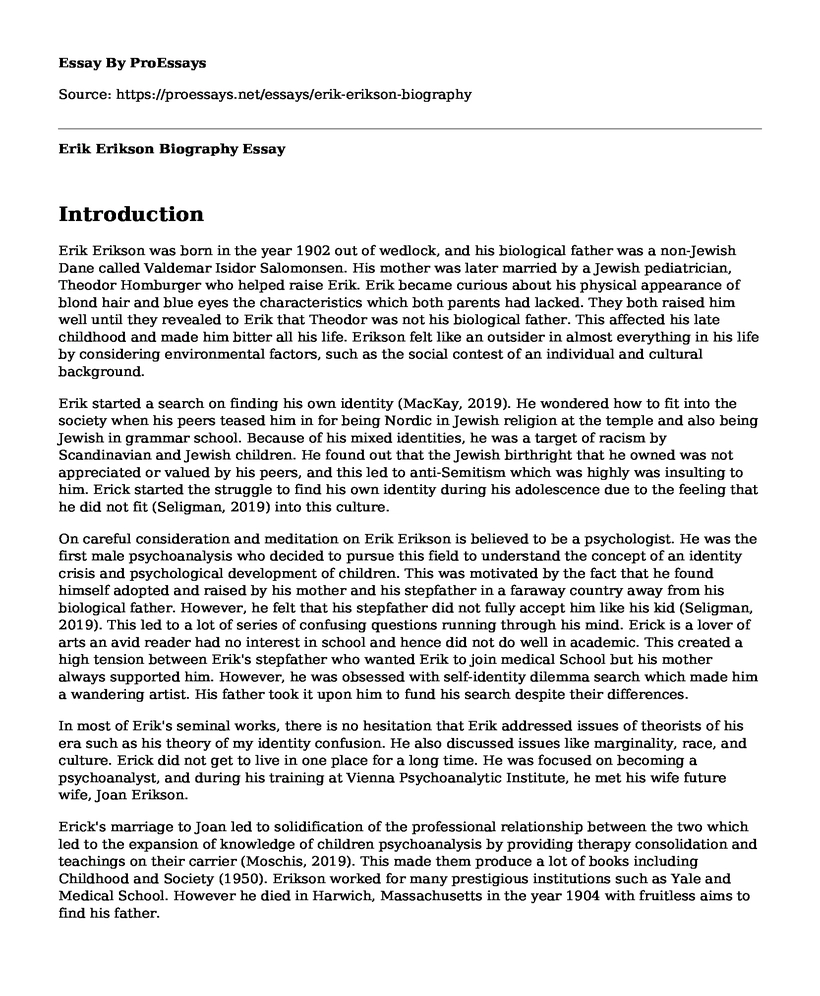Introduction
Erik Erikson was born in the year 1902 out of wedlock, and his biological father was a non-Jewish Dane called Valdemar Isidor Salomonsen. His mother was later married by a Jewish pediatrician, Theodor Homburger who helped raise Erik. Erik became curious about his physical appearance of blond hair and blue eyes the characteristics which both parents had lacked. They both raised him well until they revealed to Erik that Theodor was not his biological father. This affected his late childhood and made him bitter all his life. Erikson felt like an outsider in almost everything in his life by considering environmental factors, such as the social contest of an individual and cultural background.
Erik started a search on finding his own identity (MacKay, 2019). He wondered how to fit into the society when his peers teased him in for being Nordic in Jewish religion at the temple and also being Jewish in grammar school. Because of his mixed identities, he was a target of racism by Scandinavian and Jewish children. He found out that the Jewish birthright that he owned was not appreciated or valued by his peers, and this led to anti-Semitism which was highly was insulting to him. Erick started the struggle to find his own identity during his adolescence due to the feeling that he did not fit (Seligman, 2019) into this culture.
On careful consideration and meditation on Erik Erikson is believed to be a psychologist. He was the first male psychoanalysis who decided to pursue this field to understand the concept of an identity crisis and psychological development of children. This was motivated by the fact that he found himself adopted and raised by his mother and his stepfather in a faraway country away from his biological father. However, he felt that his stepfather did not fully accept him like his kid (Seligman, 2019). This led to a lot of series of confusing questions running through his mind. Erick is a lover of arts an avid reader had no interest in school and hence did not do well in academic. This created a high tension between Erik's stepfather who wanted Erik to join medical School but his mother always supported him. However, he was obsessed with self-identity dilemma search which made him a wandering artist. His father took it upon him to fund his search despite their differences.
In most of Erik's seminal works, there is no hesitation that Erik addressed issues of theorists of his era such as his theory of my identity confusion. He also discussed issues like marginality, race, and culture. Erick did not get to live in one place for a long time. He was focused on becoming a psychoanalyst, and during his training at Vienna Psychoanalytic Institute, he met his wife future wife, Joan Erikson.
Erick's marriage to Joan led to solidification of the professional relationship between the two which led to the expansion of knowledge of children psychoanalysis by providing therapy consolidation and teachings on their carrier (Moschis, 2019). This made them produce a lot of books including Childhood and Society (1950). Erikson worked for many prestigious institutions such as Yale and Medical School. However he died in Harwich, Massachusetts in the year 1904 with fruitless aims to find his father.
Conclusion
In conclusion, Erick made a significant impact on psychology when he emphasized that the environment played a significant role in self-identity self-awareness adjustment and individual development (Moschis, 2019). The people surrounding you have an impact on your life either positive or negative. He says that every person faces challenges and the way she or he faces this challenge will determine whether you stagnate or develop further.
References
MacKay, M. (2019). Albert Camus.Metamorphosis, Retrieved from http://metamorphosis.coplac.org/index.php/metamorphosis/article/view/248
Moschis, G. P. (2019). The Life Course Paradigm: Conceptual and Theoretical Foundations. In Consumer Behavior over the Life Course (pp. 37-59). Springer, Cham. https://doi.org/10.1007/978-3-030-05008-5_3
Seligman, S. (2019). Louis Sander and Contemporary Psychoanalysis: Nonlinear Dynamic Systems, Developmental Research, Clinical Process and the Search for Core Principles. Psychoanalytic Inquiry, 39(1), 15-21.https://doi.org/10.1080/07351690.2019.1549908
Cite this page
Erik Erikson Biography. (2022, Dec 17). Retrieved from https://proessays.net/essays/erik-erikson-biography
If you are the original author of this essay and no longer wish to have it published on the ProEssays website, please click below to request its removal:
- Essay Sample on Revenge
- Annotated Bibliography on Depression of College Students
- Essay Example on Burnout: Psychological Exhaustion of Mental Health Counsellors
- Sharpen Your Saw: Research Paper on Principles of Balanced Self-Renewal
- Paper Example on Adolescents Need Sexuality Education for Healthy Sexual Outcomes
- Paper Sample on Nurses: Prone to Burnout Due to Stressful Environments
- Free Essay Sample on Stress: A Silent Killer of Health and Wellbeing







